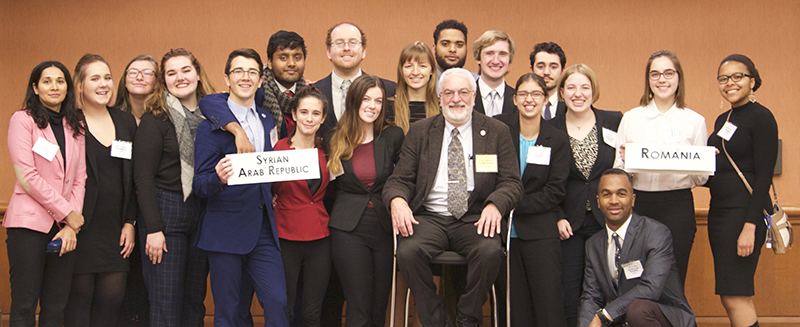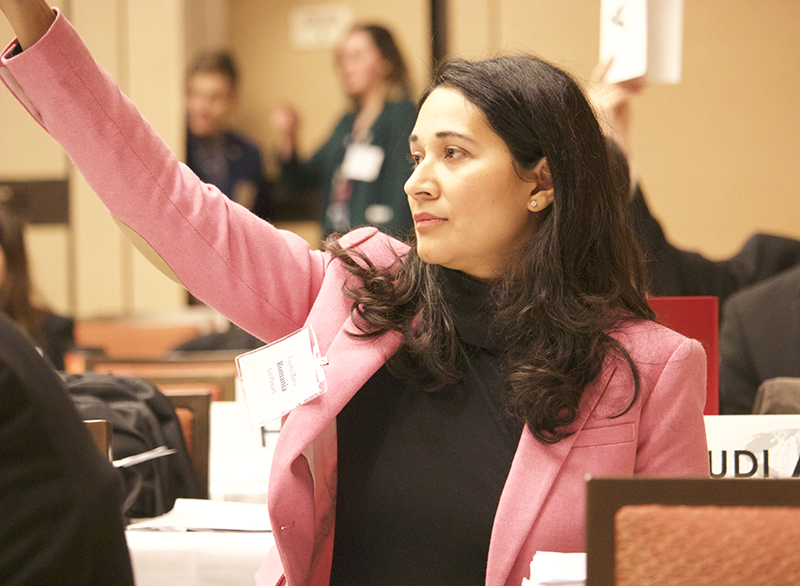Model United Nations (MUN)


Model UN promotes awareness of international issues, and also instills an appreciation of the critical role of the United Nations in peacefully resolving conflicts and forging collective responses to global problems. EMU involvement dates to the 1970s, when students organized a Model UN conference through the Great Lakes Invitational Conference Association.
The EMU Model UN program was formalized in 1992 with the addition of a course on the United Nations. Strong student interest led to the creation of a Model UN Club in 2000. Since then, EMU's Model UN team has been composed of two groups of students, those who are members of the club (the United Nations Association at EMU, UNA-EMU) and those enrolled in the Model UN course, PLSC 343L.
For more information, please contact faculty adviser Dr. Soltani at [email protected].
EMU at Model United Nations Conferences
The primary focus of both the club and class is to prepare students to participate in Model United Nations conferences, which consist of a realistic simulation of a session of the United Nations. In recent years, we have sent delegations to the annual American Model United Nations (AMUN) in Chicago and the National Model United Nations (NMUN) in New York, as well as international simulation conferences in Edinburgh, Toronto and Madrid. EMU delegations have received numerous awards for outstanding diplomatic representation.
We have also participated in other intercollegiate simulations of multilateral diplomacy, including Model Arab League and Model European Union. Many EMU students have gone on to serve on staff for university and high school conferences.
Model UN Program Description and Background
At Model UN conferences, delegations of college students represent the 193 nations of the world in the various bodies and councils of the UN, including the Security Council, the General Assembly, the six main committees of the General Assembly, the Economic and Social Council, and some of the many UN specialized agencies. In committee and council sessions, the students represent the positions of their assigned countries on actual issues currently being considered by the United Nations. Preparation for each conference involves months of research on the issues and on various countries’ foreign policy positions and priorities, in addition to practice mini-simulations on campus.
Students engage in formal debate on such topics, discuss them informally in caucus, and draft resolutions that specify actions to be taken and programs to be implemented. To be adopted, resolutions must be supported by a majority of states in the General Assembly. Ideally, they should be adopted by all, or nearly all, members. In order to build consensual support for a resolution, student delegates must engage in extensive discussions and negotiations – just like the actual policy process of the United Nations.


The Wider Reach and Benefits of Model UN at EMU
By participating in Model UN, students enjoy a "hands-on" learning experience that significantly augments their education. They acquire expertise on international issues and conflicts, as well as knowledge of multilateral diplomacy and the operations of the UN. They also develop speaking and negotiation skills, and learn how to work with others to solve real world problems.
Participation in the EMU Model UN program instills a deep understanding of international institutions, collective security, foreign policy formulation, and multilateral diplomacy in future leaders, thus contributing to public awareness of, and support for peaceful approaches to the resolution of international conflicts. Empowered with knowledge of world affairs and enhanced skills, EMU students have become important leaders and agents for change.
Upcoming Activities
- In November 2024, EMU Students will travel to Chicago with Prof. Ebrahim Soltani to represent Ukraine and Mozambique at the American Model United Nations (AMUN) conference with over 1,400 participants.
- In February 2025, EMU students will travel to Toronto to participate in the North American Model United Nations (NAMUN)
- In April 2025, EMU students will travel to New York City to participate in the National Model United Nations (NMUN)
Accomplishments of Recent Model UN Alums
Among some of the things our recent Model UN alumni have gone on to do:
- Master's programs in International Affairs at George Washington University, American University and the United Nations University for Peace in Costa Rica
- J.D. from DePaul University Law School, practicing immigration law in Columbus, Ohio
- U.S. Department of State, Foreign Service Officer with postings in Moscow and Baghdad
- Internships at UN Headquarters in New York with the Permanent Missions of the African Union, Costa Rica, Lebanon, and Sri Lanka
- Practicum in Advocacy with the UN Commission on the Status of Women (CSW), at UN Headquarters in New York, sponsored by the Women’s International League for Peace and Freedom (WILPF)
- Research Fellow at the South Asian American Policy & Research Institute, Chicago
- AmeriCorps positions with the International Rescue Committee refugee youth program in Seattle, and Asian Human Services in Chicago
- Fulbright grant to teach English in Mexico
- Peace Corps in the Republic of Georgia
- Work with international non-governmental organizations (NGOs) such as Save the Children, Doctors without Borders, AfricAid, and the French humanitarian group ACTED; and with inter-governmental organizations (IGOs) such as the World Food Program in Jordan
- Business Development Manager at Global Educational Excellence

